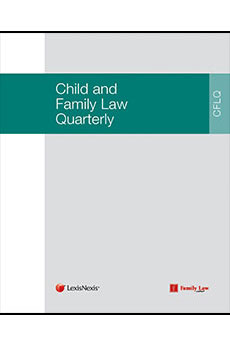- News & Comment
-
Online Shop
Online Services
Looseleafs
Law Reports
Books and eBooks
-
CPD & Events
Webinars
- Authors
- About Family Law
- Contact

Dr Ellen Gordon-Bouvier, Oxford Brookes University
Key words: Divorce – Prenuptial Agreement – Clean Break – Autonomy – Temporality
 The full version of this article will appear in Child and Family Law Quarterly, Vol 32, No 1.
The full version of this article will appear in Child and Family Law Quarterly, Vol 32, No 1.
Find out more or request a free 1-week trial of Child and Family Law Quarterly. Please quote: 100482.
This article takes a novel approach by applying a theoretical framework of temporality to the law governing financial obligations on divorce. Although under-explored, particularly in family law, time and temporality are powerful tools of legal governance that reinforce norms and expectations of behaviour. The article explores family law’s increasing preoccupation with principles of individual autonomy, as demonstrated through the recognition of prenuptial agreements and the expectation of financial self-sufficiency post-divorce. It argues that law’s expectations of autonomy are reflected through temporal mechanisms, promoting liberal ideals of linear progress and modernity. The prenup and the clean break are based on an imagined legal subject who can seamlessly move on from the divorce towards an ‘open future’ that is unconstrained by obligations from the marriage. However, as the article argues, family law’s imagined linear temporality conflicts with the temporal experiences of caregivers. Although the certainty promised by the prenup and the clean break is lauded as a universal good, caregivers face considerable temporal barriers to self-righting post-divorce. Problematically, neoliberal rhetoric paints longer-term financial hardship as a personal failure rather than a societal problem, frequently depicting the caregiver as someone stuck in the past and preventing the former spouse from moving forwards.
This article has been accepted for publication in Child and Family Law Quarterly in Issue 1, Vol 32, Year 2020. The final published version of this article will be published and made publicly available here 24 months after its publication date, under a CC-BY-NC licence.






